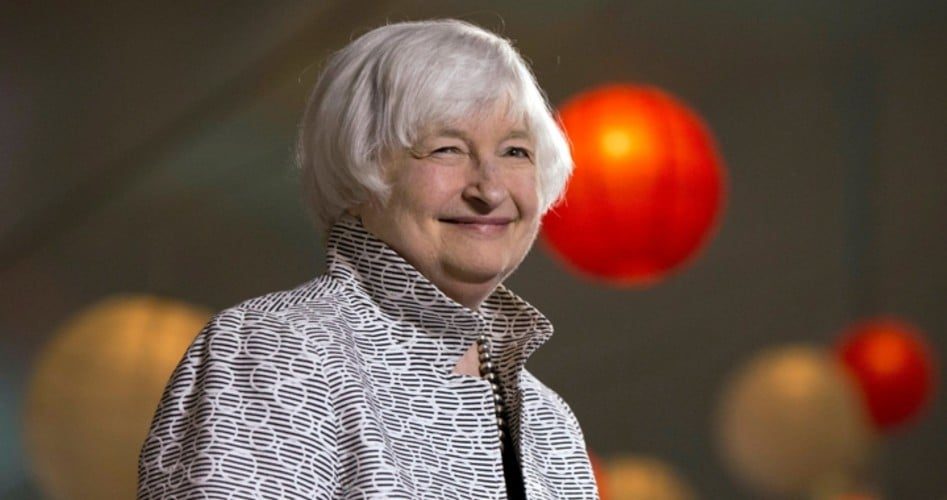
Janet Yellen, likely still miffed at being passed over by President Trump in favor of Jerome Powell as head of the Federal Reserve last February, had a chance to vent about the president’s ignorance on Monday. In a radio interview on Marketplace with host Kai Ryssdal, she said, “President Trump’s comments about Chair Powell and about the Fed do concern me, because if that [criticism] becomes concerted, I think it … could undermine confidence in the Fed. I think that would be a bad thing.”
Ryssdal asked: “Do you think the president has a grasp of macroeconomic policy?”
Yellen: “No, I do not.”
Ryssdal: “Tell me more.”
Yellen: “Well, I doubt that he would even be able to say that the Fed’s goals are maximum employment and price stability … I think [his] comments show a lack of understanding of the impact of the Fed on the economy….”
These comments are from a lifelong academic and Keynesian who has never built anything in the real world and has never met a payroll. A better question would be: How does a liberal academic such as Yellen get off criticizing the president, who has been supremely successful in navigating the shoals of fickle “macroeconomic policy” as implemented by the Fed and building a business worth billions in spite of that intentional interfence?
Born in secrecy and conspiracy more than one hundred years ago, the Fed has long outgrown its original anticipated mandate and now serves, not to “maximize employment” and maintain “price stability” as the public is continually misled to believe, but instead to manipulate the economy according to the agenda of the international bankers who created it.
One of those international bankers, Paul Warburg, a partner at the international investment banking firm Kuhn, Loeb, and Company, outlined what happened that fateful November in 1910:
I was invited to join a small group of men who, at Senator [Nelson] Aldrich’s request, were to take part in a several days’ conference with him, to discuss the form that the new banking bill should take.… When the conference closed … the rough draft of what later became the Aldrich Bill had been agreed upon….
The results of the conference were entirely confidential. Even the fact that there had been a meeting was not permitted to become public….
Though eighteen years have gone by, I do not feel free to give a description of this most interesting conference concerning which Senator Aldrich pledged all participants to secrecy.
Since then the Fed’s role (interference) in the free market economy has greatly expanded. By its own words, the Fed’s responsibilities fall into four general areas:
Conducting the nation’s monetary policy by influencing money and credit conditions in the economy in pursuit of full employment and stable prices;
Supervising and regulating banks and other important financial institutions to ensure the safety and soundness of the nation’s banking and financial system and to protect the credit rights of consumers;
Maintaining the stability of the financial system and containing systemic risk that may arise in financial markets; and
Providing certain financial services to the U.S. government, U.S. financial institutions, and foreign official institutions, and playing a major role in operating and overseeing the nation’s payments systems.
Former Texas Congressman Ron Paul boiled all of this verbiage down to this: “The Fed was created to act as a backstop for the big banks as well as the financier of big government.”
What was left unsaid is that the Fed’s so-called “independence” is a cover for its unconstitutionality. The Fed itself admits that it is “an independent central bank because its monetary policy decisions do not have to be approved by the President or anyone else in the executive or legislative branches of government.”
One searches the Constitution in vain for any such authorization of power granted by the several states to its national government to create such an institution.
But it serves the insiders well. During Yellen’s 14-year long association with the central bank (she was president of the Federal Reserve Bank of San Francisco before becoming vice chair of the Fed and then moving on, under President Obama, to become the Fed’s 15th chair in 2014) she rarely missed an opportunity to criticize the free market. A self-declared Keynesian, she asked rhetorically, “Will capitalist economies operate at full employment in the absence of routine intervention? Certainly not. Do policy makers have the knowledge and ability to improve macroeconomic outcomes rather than make matters worse? Yes.”
She repeated the anti-capitalist refrain in 2012: “While [we on the Federal Reserve board are] admirers of capitalism, we also to a certain extent believe it has limitations that require government intervention in markets to make them work.”
She supported and defended Fed Chair Ben Bernanke’s “quantitative easing” (QE) which poured more than $3 trillion of new (read: created) money into big banks’ coffers following the real estate crash a decade ago. She added that once the crisis was over, U.S. monetary policy would revert back to a less intrusive role. The country continues to wait in vain for that.
As Yellen voiced her criticism of President Trump over his apparent lack of understanding about what the Fed is trying to do, it’s helpful to remember that the real purpose of the Fed is to provide a financial backstop for the big banks and to fund the federal government’s deficits at low interest rates.
Photo: AP Images
An Ivy League graduate and former investment advisor, Bob is a regular contributor to The New American blog primarily on economics and politics. He can be reached at [email protected].
Related articles:



